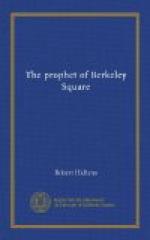“I thought you might like to have some tea,” began the Prophet, in his most soothing manner, while Mr. Ferdinand, with pursed lips, softly arranged that beverage upon the seat which Mr. Sagittarius—so we must call him—had just vacated.
“Thank you,” said Madame Sagittarius, with dignity. “It would be acceptable. The long journey from the banks of the Mouse to these central districts is not without its fatigue. A beautiful equipage!”
“You said—”
“You have a very fine equipage.”
“You have seen the brougham?” said the Prophet, in some surprise.
“What broom?” buzzed Madame Sagittarius.
“I thought you were admiring—”
“The tea equipage.”
“Oh, yes, to be sure. Queen Anne silver, yes.”
“A great woman!” said Madame Sagittarius, spreading a silk handkerchief that exactly matched the ostrich tips in her bonnet carefully over her velvet lap. “All who have read Mrs. Markham’s work of genius with understanding must hold her name in reverence. A noble creature! A pity she died!”
“A great pity indeed!”
“Still we must remember that Mors omnis communibus. We must not forget that.”
“No, no.”
“And after all it is the will of Providence. Mors Deo.”
“Quite so.”
During this classical and historical retrospect Mr. Ferdinand had finished his task and quitted the apartment. As soon as he had gone Madame Sagittarius continued,—
“As the mother of Corona and Capricornus I feel it my duty to ask you, sir—that is, Mr.—”
“Vivian.”
“Mr. Vivian, whether the illness in your house is really only ankles as the gentleman who opened the door assured me?”
“It is only that.”
“Not catching?”
“Oh, dear, no.”
“There, Sophronia!” said Mr. Sagittarius. “I told you it was merely the prophecy.”
He suddenly assumed a formidable manner, and continued,—
“And now, sir, that we are alone—”
But Madame interrupted him.
“Kindly permit our host to succour my fatigue, Jupiter,” she said severely. “I am greatly upset by the journey. When I am restored we can proceed to business. At present I am fit only for consolation.”
Mr. Sagittarius subsided, and the Prophet hastily assisted the victim of prolonged travel to some buttered toast. Having also attended to the wants of her precipitate underling, he thought it a good opportunity to proceed to a full explanation with the august couple, and he therefore remarked, with an ingratiating and almost tender smile,—
“I think I ought to tell you at once that there will be no need for any further anxiety on your part. I have put down my telescope and have—well, in fact, I have decided once and for all to give up prophecy for the future.”
The Prophet, in his innocence, had expected that this declaration of policy would exercise a soothing influence upon his guests, more especially when he added—it is to be feared with some insincerity,—




